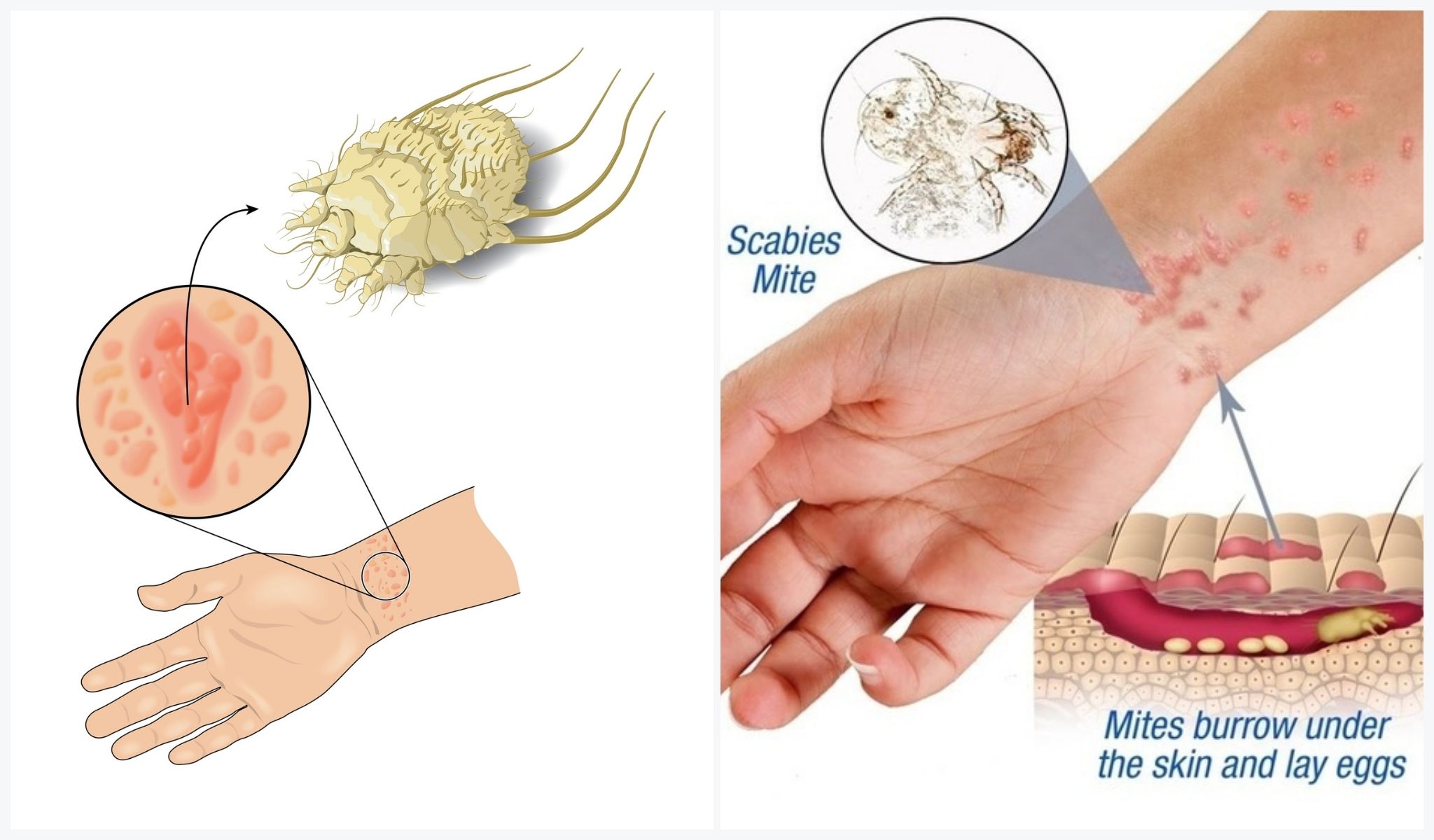SCABIES

What is Scabies?
Scabies is a Highly Contagious itchy skin rash caused by a tiny burrowing mite called Sarcoptes scabiei (Itch Mite). This microscopic mite burrows into the top layer of the skin, where it lays eggs and causes an itchy skin condition known as scabies.
Symptoms of Scabies
Scabies is a common skin condition that can affect people of all ages and backgrounds. It spread from one person to another causing intense itching and a rash. Itching is often worse at night, when your skin is warmer.
Here are some key characteristics and symptoms of Scabies:
- Intense Itching: The most common and hallmark symptom of scabies is severe itching, which often becomes more intense at night. The itching is caused by an allergic reaction to the mite and its feces.
- Skin Rash: A red, pimple-like rash may develop in the areas where the mites burrow. These rashes can appear anywhere on the body but are often found in skin folds, between fingers, on wrists, elbows, knees, and genitals.
- Burrows: In some cases, thin, wavy lines or tracks can be seen on the skin’s surface. These are the burrows created by the mites as they move beneath the skin.
- Secondary Infections: Scratching the intensely itchy rash can break the skin, leading to secondary bacterial infections. These infections can cause additional symptoms like pain, swelling, and pus-filled sores.
Treatment:
Scabies is treatable with prescription medications that kill the mites and their eggs. It’s important to seek medical advice for proper diagnosis and treatment. Left untreated, scabies can continue to cause itching and discomfort and may lead to complications such as bacterial skin infections.
How to stop Scabies from spreading?
Scabies typically spreads through close, prolonged skin-to-skin contact. It can also be transmitted through infested clothing, bedding, or towels. It’s important to note that scabies is not related to poor hygiene; anyone can get it.
Preventing the spread of scabies involves taking several measures to eliminate the mites and their eggs from your body and environment, as well as minimizing close contact with others. Here are some steps you can take to stop scabies from spreading:
- Avoid Close Personal Contact: Scabies is highly contagious through skin-to-skin contact. Avoid close contact with others until you have completed treatment and are no longer contagious. This includes sexual contact, hugging, and sharing a bed.
- Don’t Scratch: Although scabies causes intense itching, scratching can lead to skin damage and increase the risk of secondary bacterial infections. Keep your nails short, and try to resist the urge to scratch the affected areas.
- Avoid Sharing Personal Items: Do not share clothing, towels, bedding, or personal items with others, as the mites can survive on these surfaces for a short period. Wash and dry all bedding and clothing on high heat to kill any mites.
- Limit Physical Contact with Infected Individuals: If someone in your household has scabies, try to minimize physical contact with them until they have completed treatment. Follow hygiene practices to reduce the risk of transmission within the household.
- Avoid Delaying Treatment: Promptly seek medical attention and follow the prescribed treatment regimen. Delaying treatment can allow the mites to multiply and worsen the infestation.
- Don’t Self-Diagnose: Scabies can sometimes be confused with other skin conditions. Avoid self-diagnosis and seek professional medical advice to confirm the presence of scabies and receive appropriate treatment.
- Avoid Over-the-Counter Remedies: Over-the-counter creams or lotions may not be effective in treating scabies. It’s essential to use prescription medications as prescribed by a healthcare provider.
- Don’t Rely on Natural Remedies Alone: While some natural remedies and home remedies may provide temporary relief from itching, they are not a substitute for medical treatment. Consult a healthcare professional for proper treatment.
- Avoid Reinfection: After treatment, take measures to avoid reinfection. This includes washing or dry-cleaning clothing and bedding, vacuuming your living environment, and disinfecting personal items.
- Don’t Assume It Will Go Away on Its Own: Scabies will not resolve on its own without treatment. Ignoring the condition can lead to prolonged discomfort and the risk of spreading the infestation to others.
Remember that scabies is highly contagious, and it can take a few weeks for the itching and rash to fully resolve even after successful treatment. It’s essential to follow your healthcare provider’s guidance and take these preventive measures to stop the spread of scabies and avoid reinfestation.
